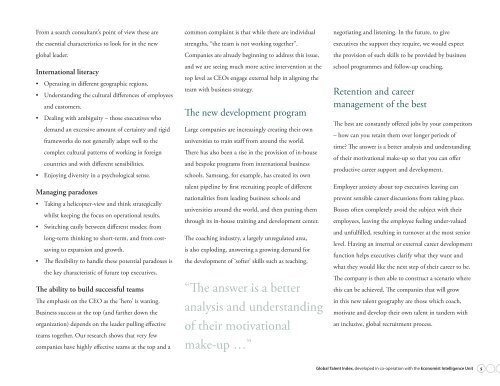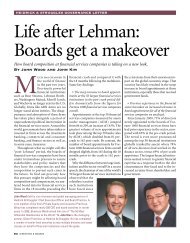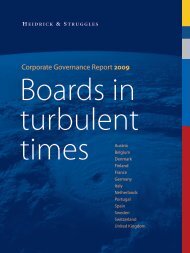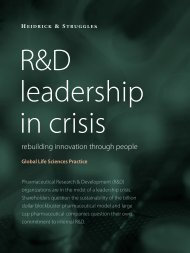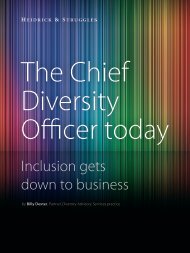Mapping Global Talent: Essays and Insights - Heidrick & Struggles
Mapping Global Talent: Essays and Insights - Heidrick & Struggles
Mapping Global Talent: Essays and Insights - Heidrick & Struggles
You also want an ePaper? Increase the reach of your titles
YUMPU automatically turns print PDFs into web optimized ePapers that Google loves.
From a search consultant’s point of view these are<br />
the essential characteristics to look for in the new<br />
global leader.<br />
International literacy<br />
• Operating in different geographic regions.<br />
• Underst<strong>and</strong>ing the cultural differences of employees<br />
<strong>and</strong> customers.<br />
• Dealing with ambiguity – those executives who<br />
dem<strong>and</strong> an excessive amount of certainty <strong>and</strong> rigid<br />
frameworks do not generally adapt well to the<br />
complex cultural patterns of working in foreign<br />
countries <strong>and</strong> with different sensibilities.<br />
• Enjoying diversity in a psychological sense.<br />
Managing paradoxes<br />
• Taking a helicopter-view <strong>and</strong> think strategically<br />
whilst keeping the focus on operational results.<br />
• Switching easily between different modes: from<br />
long-term thinking to short-term, <strong>and</strong> from cost-<br />
saving to expansion <strong>and</strong> growth.<br />
• The flexibility to h<strong>and</strong>le these potential paradoxes is<br />
the key characteristic of future top executives.<br />
The ability to build successful teams<br />
The emphasis on the CEO as the ‘hero’ is waning.<br />
Business success at the top (<strong>and</strong> farther down the<br />
organization) depends on the leader pulling effective<br />
teams together. Our research shows that very few<br />
companies have highly effective teams at the top <strong>and</strong> a<br />
common complaint is that while there are individual<br />
strengths, “the team is not working together”.<br />
Companies are already beginning to address this issue,<br />
<strong>and</strong> we are seeing much more active intervention at the<br />
top level as CEOs engage external help in aligning the<br />
team with business strategy.<br />
The new development program<br />
Large companies are increasingly creating their own<br />
universities to train staff from around the world.<br />
There has also been a rise in the provision of in-house<br />
<strong>and</strong> bespoke programs from international business<br />
schools. Samsung, for example, has created its own<br />
talent pipeline by first recruiting people of different<br />
nationalities from leading business schools <strong>and</strong><br />
universities around the world, <strong>and</strong> then putting them<br />
through its in-house training <strong>and</strong> development center.<br />
The coaching industry, a largely unregulated area,<br />
is also exploding, answering a growing dem<strong>and</strong> for<br />
the development of ‘softer’ skills such as teaching,<br />
“The answer is a better<br />
analysis <strong>and</strong> underst<strong>and</strong>ing<br />
of their motivational<br />
make-up …”<br />
negotiating <strong>and</strong> listening. In the future, to give<br />
executives the support they require, we would expect<br />
the provision of such skills to be provided by business<br />
school programmes <strong>and</strong> follow-up coaching.<br />
Retention <strong>and</strong> career<br />
management of the best<br />
The best are constantly offered jobs by your competitors<br />
– how can you retain them over longer periods of<br />
time? The answer is a better analysis <strong>and</strong> underst<strong>and</strong>ing<br />
of their motivational make-up so that you can offer<br />
productive career support <strong>and</strong> development.<br />
Employer anxiety about top executives leaving can<br />
prevent sensible career discussions from taking place.<br />
Bosses often completely avoid the subject with their<br />
employees, leaving the employee feeling under-valued<br />
<strong>and</strong> unfulfilled, resulting in turnover at the most senior<br />
level. Having an internal or external career development<br />
function helps executives clarify what they want <strong>and</strong><br />
what they would like the next step of their career to be.<br />
The company is then able to construct a scenario where<br />
this can be achieved. The companies that will grow<br />
in this new talent geography are those which coach,<br />
motivate <strong>and</strong> develop their own talent in t<strong>and</strong>em with<br />
an inclusive, global recruitment process.<br />
<strong>Global</strong> <strong>Talent</strong> Index, developed in co-operation with the Economist Intelligence Unit


